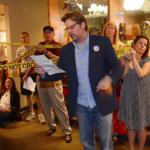Albuquerque Campaign Against Police Violence Intensifies at Chaotic Protest

Activists in Albuquerque have vowed to continue confronting city authorities over police shootings a day after they occupied the mayor's office, prompting chaotic scenes and 13 arrests.
The arrests and detentions on Monday night marked a hardening response by authorities to a campaign which has demanded radical reform of the New Mexico city's trigger-happy police department.
About two-dozen activists staged a sit-in at the office of Mayor Richard Berry, triggering acrimonious exchanges with officials and the suspension of a city council meeting before guards and police hauled them away. It was the third time in recent weeks that the city council has been disrupted.
“We're going to be in this administration's face until we feel safe in our city,” Ken Ellis told the Guardian on Tuesday. “This community is in fear of its police.” Ellis' 25-year-old son was shot dead by police in 2010.
The arrested activists spent the night in jail and were charged with criminal trespassing, unlawful assembly and interfering with a public official or staff.
One protestor, David Correia, a University of New Mexico professor, was charged with a felony for allegedly pushing a security guard.
Other protestors disputed that, saying Correia had his arms by his side and attempted to walk past the guard, who then bumped him against a wall. They also said the guard warned beforehand what would happen.
“I was right there. He told that he would chest-bump him and have him charged with a felony,” said Nora Tachias-Anaya. Ellis said the incident was captured on camera and would be distributed.
Correia said he would plead not guilty to the charge. “I didn't do what they are charging me with.” The mayor's office did not immediately respond to an interview request.
The Albuquerque police have shot dead 25 people since 2010, by US standards a high number for a city of 550,000 people.
Simmering anger erupted into coordinated protest after a video surfaced in March showing police shooting James Boyd, a mentally ill homeless man. Last month activists took over a council meeting and attempted a symbolic citizens' arrest of the police chief. They staged a silent protest at a subsequent council meeting, prompting guards to escort them out.
A long-awaited US Department of Justice report in April detailed a pattern of excessive force, including a policy of shooting at moving vehicles to disable them, and officers being allowed to use personal weapons instead of standard-issue firearms. “Officers see the guns as status symbols,” it said. “APD personnel we interviewed indicated that this fondness for powerful weapons illustrates the aggressive culture.”
The police department has since banned the use of personal guns and the practice of shooting to disable moving cars. Other reforms are expected.
Monday's council meeting – abandoned after the building was locked-down – was due to debate a tax increase for mental health and homeless services and legislation to overhaul civilian oversight of the police.
Gilbert Montaño, the mayor’s chief of staff, said he expected the meeting to be held later this or next week.
Mayor Berry, it turned out, was in New York when protestors occupied the reception of his office on the 11th floor of city hall. Montaño told reporters arrests were made only after it became clear they would not leave unless forced.
At least one protester chained herself to furniture. Others strung police tape. Mike Gomez, whose 22-year-old son was shot dead in 2011, said activists were frustrated with the pace of change and the mayor's refusal to meet them. “These arrests were the city of Albuquerque retaliating against peaceful protest.”
Nora Tachias-Anaya said the charges against were bogus and accused authorities of overreacting. “They shackled my hands so tight that I was screaming blood murder but they never tried to loosen them.” A protest march at a park is scheduled for 21 June.
